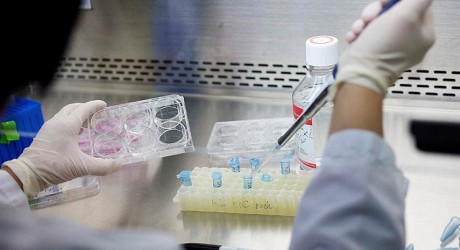SHEFFIELD, England, Wednesday January 20, 2016 – Patients with multiple sclerosis (MS) are showing “remarkable” improvements after receiving a treatment usually used for cancer, doctors in Sheffield say.
Several patients have received bone marrow transplants using their own stem cells. Dramatic results include the restoration of some previously paralysed patients’ ability to walk.
MS, an incurable neurological condition, causes the immune system to attack the lining of nerves in the brain and spinal cord. Most patients are diagnosed in their 20s and 30s.
BBC News reports that the new treatment – known as an autologous haematopoietic stem cell transplant (HSCT) – aims to destroy the faulty immune system using chemotherapy, and then rebuild it with stem cells harvested from the patient’s own blood. These replacement cells are at such an early stage that they have not developed the flaws that trigger MS.
Professor John Snowden, consultant haematologist at Sheffield’s Royal Hallamshire Hospital, told the BBC: “The immune system is being reset or rebooted back to a time point before it caused MS.”
About 20 MS patients have been treated in Sheffield in the past three years, and Professor Snowden commented: “It’s clear we have made a big impact on patients’ lives, which is gratifying.”
But doctors in Australia have urged caution in using HSCT.
MS Research Australia (MSRA), which said the treatment is available on a very limited basis in Australia for patients with severe MS who have not responded to other therapies, warned that while the outcome for some of the patients in the UK trial has been very positive, it may not work for all forms of MS. They caution that more research is needed to understand who will benefit the most from the treatment which can also carry significant risks.
“[Only] until we have carefully conducted trials that look in a very careful way at the outcomes of this treatment will we know whether its any good,” said Professor of Stem Cell Sciences at the University of Melbourne, Dr. Martin Pera, who noted that the treatment uses chemotherapy, which is more aggressive than other treatments available.
“This is not like taking an asprin or a valium. These are toxic drugs with a number of side-effects. Certainly its not a treatment you would undergo unless you had very strong indications that it would actually do some good.”
The BBC’s Panorama programme was given exclusive access to several patients who have undergone the stem cell transplant.
They included Steven Storey, who was diagnosed with MS in 2013 and, within a year, went from being an able-bodied athlete to wheelchair-bound, with the sensation in much of his body lost.
“I went from running marathons to needing 24-hour acute care. At one point I couldn’t even hold a spoon and feed myself,” he told the BBC.
Within a few days of the transplant he was able to move his toes, and after four months he could stand unaided.
Storey still needs a wheelchair but is astounded at his progress: “It’s been incredible. I was in a dire place, but now I can swim and cycle and I am determined to walk, he said.”
Another stem cell transplant recipient is Holly Drewry, who was just 21 when she was diagnosed with MS. Her condition deteriorated after she gave birth to her daughter Isla.
She said “Within a couple of months I got worse and worse. I couldn’t dress or wash myself; I didn’t even have the strength to carry my daughter,” she told the BBC.
Drewry needed a wheelchair before her transplant, but walked out of hospital after the treatment.
“It’s been a miracle. I got my life and my independence back and the future is bright again in terms of being a mum and doing everything with Isla,” she said.
After two years, she has suffered no relapses and there is no evidence of active disease on her scans.
Doctors describe her MS as dormant, but there is hope that the transplant might be a permanent fix.
Britain’s Royal Hallamshire Hospital, together with hospitals in the United States, Sweden and Brazil, is part of an international trial known as MIST, which is assessing the long-term benefits of the stem cell transplant.
All those on the trial have relapsing remitting MS, where patients experience attacks or relapses followed by periods of remission.
Professor Richard Burt of Northwestern University, Chicago, carried out the first HSCT for MS as long ago as 1995 and is coordinating the international trial which began in 2006.
A study published last year involving MS patients in Chicago showed significant reductions in neurological disability, and for some the improvements persisted for at least four years, although there was no comparative control group.
The outcome of the more detailed MIST trial, which will report in a couple of years, could determine whether the stem cell transplant becomes a standard treatment for many MS patients. (Caribbean 360)














